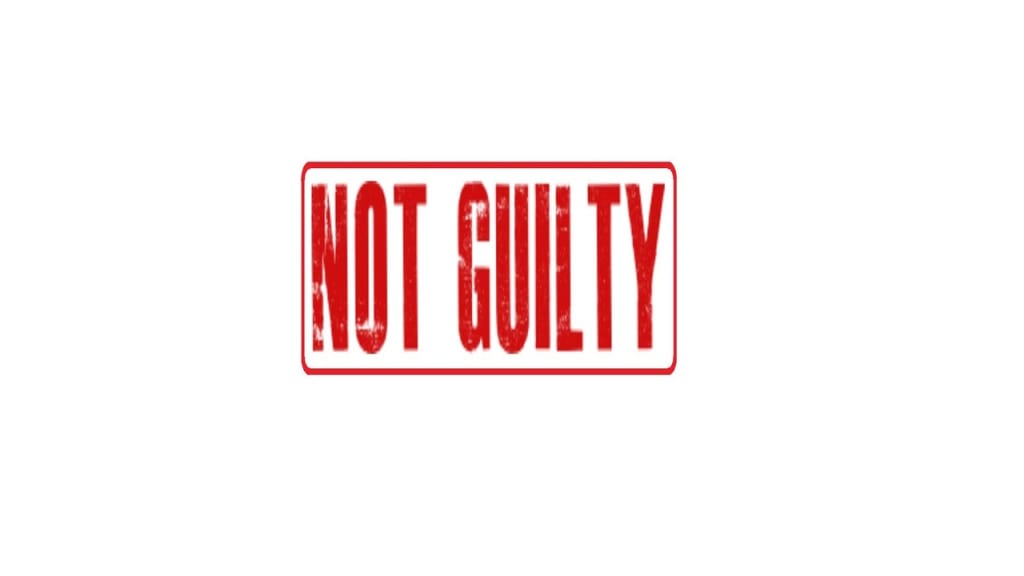
Introduction
The statement "I'm not guilty" holds a lot of weight in the legal system. It is an appeal made by someone who fervently maintains their innocence and asks to be cleared of the charges leveled against them. However, beyond the surface, there is a complicated web of legal processes, evidence, and individual interpretations that surrounds the idea of guilt and innocence. This article explores the complex nature of innocence, examining the elements that influence whether someone is perceived to be guilty or innocent, the difficulties experienced by those who claim their innocence, and the repercussions of erroneous convictions. We hope to shed light on the experiences of those who find themselves falsely accused as well as the societal repercussions of assuming guilt without conducting a thorough investigation by unraveling these complexities.
The Onus of Proof
In a court of law, it is the prosecution's responsibility to prove guilt beyond a reasonable doubt. In actuality, though, it might frequently fall on the accused to establish their innocence. This section examines the difficulties people encounter when attempting to prove their innocence in court, highlighting the significance of a fair and unbiased judicial system.
Misidentification and False Accusations
Unfortunate facts like false charges and misidentification can result in innocent people being unfairly convicted. We shed light on the elements that contribute to false charges and the terrible effects they can have on a person's life by looking at high-profile cases and psychological studies.
The Legal System's Defects
Investigations, trials, and appeals can all end in mistakes because no legal system is perfect. The faults in the judicial system that could result in erroneous convictions are exposed in this section. We examine the structural problems that undercut the presumption of innocence, ranging from faulty forensic evidence to prosecutorial misconduct.
The Effects of Incorrect Convictions
In addition to destroying the lives of the innocent parties involved, wrongful convictions often undermine public confidence in the legal system. This section looks at the psychological, social, and financial effects of false convictions while highlighting the urgent need for reforms to stop similar errors in the future.
Exonerations and Post-Conviction Relief Advances
More innocent people are being freed after years of unjust imprisonment because to advancements in technology and the hard work of advocacy groups. This section emphasizes the importance of post-conviction relief, the advent of innocence projects, and DNA testing as key factors in redressing historical injustices.
A Weak Shield: The Presumption of Innocence
In many democratic cultures, the cornerstone of the legal system is the idea of "innocent until proven guilty." However, in reality, media sensationalism, popular opinion, and cultural prejudices frequently undercut this assumption. Defendants must fight against the overwhelming weight of society's assumption of guilt in order to persuade a jury that they are innocent.
The Issue with Police Abuse and False Evidence
Numerous high-profile cases have revealed instances of police wrongdoing, such as the planting of evidence, interfering with crime scenes, or coercing witnesses. Such infractions significantly damage public confidence in law enforcement and make it more difficult for offenders to prove their innocence.
How Forensic Science Contributes to Incorrect Convictions
The initial goal of forensic science advancements was to support justice. But it has now become clear that several forensic methods are defective or subjective. This section explores how forensic science contributes to erroneous convictions and emphasizes the need for a more rigorous assessment of its use.
The Effects of Socioeconomic and Racial Bias
Every step of the criminal justice process, from police investigations through jury selection, can be tainted by racial and socioeconomic bias. Minorities and those from low socioeconomic status are disproportionately harmed and have a difficult time establishing their innocence in a biased system.
DNA Evidence's Function in Exonerations
Numerous people who were falsely condemned have been exonerated as a result of the development of DNA testing. This section explores the value of DNA evidence in establishing the truth and how it can change how the criminal justice system handles claims of innocence.
The Exoneration Process: A Protracted and Difficult Process
Exoneration is a challenging and drawn-out process. This section examines the legal options open to persons who maintain their innocence, illuminating the challenges they have in establishing their innocence beyond a reasonable doubt.
Life after Exoneration: Challenges
After being wrongfully convicted, regaining freedom just marks the start of fresh difficulties. This section explores the challenges exonerates encounter when attempting to reconstruct their life and reintegrate back into society.
Criminal Justice Reform Is Needed
There are significant concerns regarding the effectiveness and fairness of the criminal justice system due to the prevalence of erroneous convictions. The emphasis in this final section is on the necessity of putting safeguards in place to defend against erroneous convictions and to restore trust in the system. It promotes substantive criminal justice reform.
The idea of innocence is more than just a claim; it encompasses the principles of justice, fairness, and the presumption of innocence up until proven guilty. We expose the shortcomings in our legal system and highlight the demand for changes to safeguard the innocent by carefully examining the nuances of guilt and innocence. False allegations, misidentification, and systematic mistakes can have grave repercussions for both the affected individuals and society as a whole. It is crucial that we critically assess the elements causing unjust convictions and try to address the structural problems with our judicial system as we strive for a more just and equitable society. We can only verify that the expression is error-free by identifying and fixing these problems. The declaration "I'm not guilty" stands for justice, truth, and the return of innocent lives. It is difficult to claim innocence while dealing with a biased and flawed criminal justice system. This article has examined the complexities underlying claims of innocence, illuminating the numerous challenges people who are falsely accused must overcome. To ensure that justice is actually delivered, it is crucial to acknowledge the prevalence of erroneous convictions and the pressing need for reform.
About the Creator
Abdul Wahab
Passionate dreamer, eternal optimist on a self-discovery journey. Embracing life's possibilities, seeking growth and connections. Curious learner, nature lover, and creative soul. Let's navigate this beautiful tapestry together!
Enjoyed the story? Support the Creator.
Subscribe for free to receive all their stories in your feed. You could also pledge your support or give them a one-off tip, letting them know you appreciate their work.






Comments
There are no comments for this story
Be the first to respond and start the conversation.